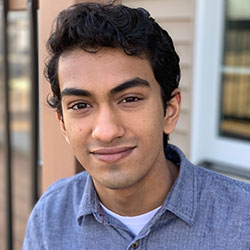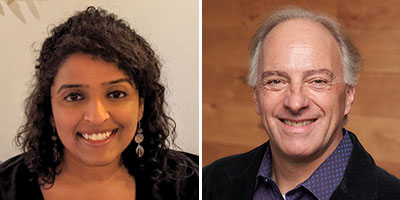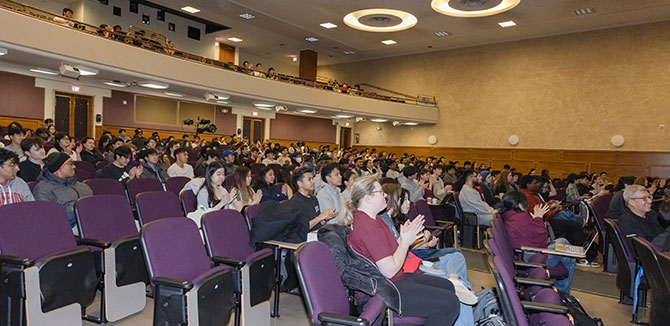WildHacks 2024 Showcases Students’ Dynamic Problem-solving Skills
Students from 14 universities completed 43 innovative software projects April 5 – 7 during the WildHacks 2024 event
Collaborative, creative, and fast-paced, WildHacks is Northwestern’s largest hackathon. The annual coding-based competition is designed for all students to learn and broaden their programming skills. Teams solve problems and innovate in a convivial, inclusive, and supportive atmosphere.
During WildHacks 2024, held April 5 - 7, approximately 300 participants from 14 universities dedicated the weekend to building functional and compelling software.

University students across the country were invited to participate. Alongside more than 200 Northwestern participants, hackers joined the in-person event from Colgate University, DePaul University, Emory University, Illinois Institute of Technology, Loyola University Chicago, Rice University, Stanford University, University of Illinois Chicago, University of Illinois Urbana-Champaign, University of Iowa, University of Pennsylvania, University of Toronto, and the University of Wisconsin–Madison.

The WildHacks organizing team also included:
- Ebube Okonji, director of logistics and programming
- Juwon Park, director of marketing and design
- Kris Yun, director of sponsorship
- Riva Lakkadi, logistics and programming support
- Defne Deda and Hunter Tran, marketing and design team
- Vivian Chen and Dahyun Kang, sponsorship team
- Annabel Edwards, Andrew Li, and Angela Zheng, technology team
To support participants with varying degrees of experience, the WildHacks team shared resources and beginner-friendly tutorials. Student organizations including Develop + Innovate for Social Change (DISC NU), Emerging Coders, Northwestern University's Student Chapter of the Institute of Electrical and Electronics Engineers (NU IEEE), and Responsible AI Student Organization (RAISO) hosted workshops. A Discord-based help channel was also available during the event to aid hackers.
WildHacks submissions
A total of 43 software projects were submitted.
In the first round of judging, all team submissions were evaluated on the criteria of technical complexity, utility, originality, design, and presentation within three tracks: urban planning, productivity, and wellness. The 10 top-rated teams were then invited to present an in-depth demo of their projects’ functionality in an interactive session with the panel of judges.
Music Notes, developed by Northwestern students Alex Feng, Shubhanshi Gaudani, and Carolyn Zou, along with Anthony Xie (Stanford University), won first place overall. The program is a study aid that leverages a language model to extract the core ideas of course readings and turn them into the titles and lyrics for catchy songs.
Northwestern team members Samarth Arul, Jeffrey Ryan, and Jonathan Zhang earned second place for FYND, an intuitive application that builds community by matching the hobbies and interests of new college graduates who are relocating to unfamiliar cities.
Angel Shot, built by Northwestern students Jack Burkhardt, Alexis Diaz-Waterman, Lev Rosenberg, and Finn Wintz, earned third place. The program helps people in uneasy or potentially unsafe situations, such as a rideshare driver taking an unfamiliar route, make a realistic-sounding phone call using an OpenAI text-to-speech system.
"I was really impressed with how far our students came in one day and the quality of their projects,” said Sruti Bhagavatula, a WildHacks 2024 judge and assistant professor of instruction at Northwestern Engineering. “It was great to hear how much students learned in the process even if they couldn't get a working project scraped together by the end. Hackathons are a chance for students to be thrown into something new and get their hands dirty and it's always successful in that respect whether they get a working product or not."
Additional winning projects included:
- The project Remap.City, by Northwestern students Ryan Newkirk, Andrew Pulver, and Franklin Zhao, earned the urban planning track award.
- Northwestern team Darin Cheng and Eliseu Kloster Filho won the productivity track award for their MathTyper tool.
- Northwestern’s Timothy Fu and James Kim earned the wellness track prize for their Fitlial fitness app.
- Best design was awarded to the web app Heartland, developed by Northwestern students Iris Ely, Miya Liu, Elysia Lopez, and Chelsey Yiran Tao.
- The iOS app MoodGenie, by Northwestern students Irena Liu, Michelle Sheen, Michelle Wang, Ziye Wang, won the best technology award.
- Netpet, a virtual internet pet, won the crowd favorite award. The screen time companion was built by Northwestern students Alison Bai, Jasmine Meyer, and Hannah Zhao.
Additional WildHacks 2024 project judges included Brylan Donaldson, associate director at The Garage at Northwestern, and Lydia Tse, software engineer at Google and adjunct lecturer in computer science at Northwestern Engineering.
Representatives from industry and the event sponsors also volunteered their time to evaluate project submissions, including Ronit Basu (Domino Data Lab), Andrew Seto, Sahar Siddiqui, and Ian Wallace (Accenture).
Hackers also had the opportunity to enter their projects into extra challenges presented and judged by Major League Hacking (MLH), a student hackathon league platform that provided support for WildHacks 2024. The MLH challenge winners included Version Control Add-on (most creative Adobe Express add-on), Bearly (best domain name from GoDaddy registry), Urban Pulse (best DEI hack sponsored by Fidelity), PocketCats.Co (best use of Kintone), and Scholarly (best use of AI in education). The project FundsFly earned both the MLH ‘best use of Starknet’ award and the Capital One challenge for best financial hack.
Sponsors of the event included Northwestern Computer Science, The Garage at Northwestern, Accenture, Call for Code, Capital One, CodeCrafters, Deloitte, and Major League Hacking. Event partners included Coca-Cola, Insomnia Cookies, and StandOut Stickers.




